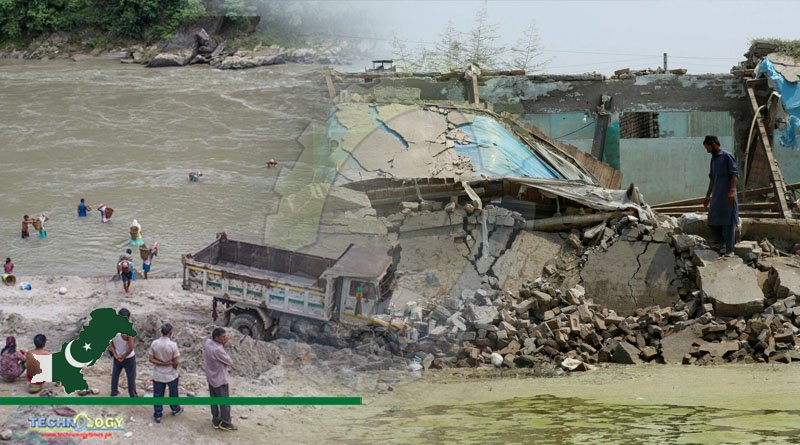Unchecked illegal construction on river beds like hotels, resorts and restaurants in Khyber Pakhtunkhwa intensified the flash floods that hit most parts of the province on August 27 damaging dozens of hotels and other settlement along the banks.

Unchecked illegal construction on river beds like hotels, resorts and restaurants in Khyber Pakhtunkhwa intensified the flash floods that hit most parts of the province on August 27 damaging dozens of hotels and other settlement along the banks.
Starting from Mataltan and Kalam valleys, the flood in river Swat had destroyed about 30 illegally constructed hotels and damaged 50 others breaking 30 years record with 243 percent excessive in the Malakand division.
The illegal construction on river beds of hotels specially in river Swat had not only obstructed flow of flood water but also turned into flash floods damaging properties in main Bahrain bazaar of the colonial era.
The data shared by the Office of Commissioner Malakand showed that about 30 hotels at Kalam, Bahrain, Madain, Landaki and Fizagat mostly built on river Swat’s beds were destroyed and another 50 damaged by flash floods at unprecedented velocity.
Similarly, 700 hotels, motels, inns and restaurants were completely inundated at Kalam, Bahrain, Kabal, Charbagh, Manglawar, Khwazakhela, Matta, Madain Mingora bypass road that inflicted colossal losses to hotel industry in Swat.
President All Swat Hotels Association, Zahid Khan claimed that recent floods have either damaged or destroyed about 50 hotels and 150 restaurants that caused about Rs 25 billion losses. He said that approximately Rs 70 billion economic losses were incurred only to tourism-related businesses in Malakand division. “The large-scale encroachment and illegal construction around banks of river Swat and other watercourses contributed to massive losses to hotels industry, trout fish, agriculture, orchards and livestock,” he said.
The situation is worrisome and raises the question as to why the concerned departments kept mum when this trend of illegal construction on river beds was flourishing. “The people, businessmen, farmers and hoteliers of Swat would continue to suffer from flood hazards if all these illegal structures are not bulldozed,” said Wajid Ali Khan, former Minister for Environment.
He said illegal construction of hotels and buildings near banks of river Swat, especially at Kalam, Bahrain and Madain had marred the natural beauty of the tourist areas besides affecting trout fish production. “The people of Swat were mostly relying on tourism business and destruction of a large number of hotels had deprived many people of their living,” Wajid said and commented, had the relevant laws been fully complied by them, the losses could have reduced manifold.
Expressing concern on illegal construction along river banks, especially in Swat, the National Assembly’s Sub-Committee on Water Resources had sought recommendations from different departments for formulating new water and environment policy for the country in view of climate change challenges.
The Sub-Committee was constituted after devastation triggered by recent flash floods and torrential rains along rivers Swat, Indus and Kunhar.
Convener of the Committee, MNA Riazul Haq said that the Federal government was mulling amendment in existing laws and enacting fresh legislation on water and environment issues including encroachment in rivers to avert any future losses due to climatic changes.
Commenting on this issue, Deputy Commissioner Swat Junaid Khan said Section 144 ban has been imposed banning all kinds of construction alongside river Swat in the aftermath of recent calamity.
He claimed that most of these hotels damaged in flood, were constructed before Rivers Protection Act 2014. “This Act strictly prohibits construction of hotels, houses and other projects within a distance of 200 feet of the rivers.” “From now onwards, no person would be allowed to construct commercial or non-commercial buildings or carryout any other development work within 200 feet of the rivers and streams in Swat,” the Deputy Commissioner said. He also warned of strict action against violators of this Act under Section 188 of PPC and said, operation against illegal construction, encroachment as well as accumulation of debris along the River Swat has already been launched.
He also mentioned to constitution a three-member committee headed by Assistant Commissioner Bahrain to work out an inclusive strategy for identification of encroachment and illegal constructions alongside river Swat.
Meanwhile, Sub Divisional Officer Irrigation Bahrain has been assigned the responsibility to identify encroachment under Khyber Pakhtunkhwa River Protection Act (Amended) 2014, for further necessary action.
Saad Khan, a spokesperson of KP Culture and Tourism Authority said that the recent flash floods had badly affected roads infrastructure, trout farms and hotels in Kalam, Bahrain and Madain. “A comprehensive survey is underway to assess actual magnitude of financial losses caused to hotel industry in Swat,” he added.
Shaukat Ali Yousafzai, Commissioner Malakand division has also expressed displeasure on illegal construction, plastic pollution and debris dumping along banks of river Swat. “Such irrational approaches were intolerable. Water and plastic pollution was having negative effects on aquatic resources in river Swat,” he commented.
The Commissioner said a high-level committee has been formed to ensure implementation of the Rivers Act 2014 in letter and spirit besides initiation of action against encroachers and violators of building laws. “An anti-encroachment drive has also been launched in Swat and construction on river banks and natural waterways was completely banned,” he said.
Since, Pakistan Tehreek-e-Insaaf was in power in Khyber Pakhtunkhwa province since last ten years and enacted the Rivers Act 2014, but seemingly it failed to get implemented this Act in letter and spirit. This failure on the part of provincial government not only resulted in loss of human lives and property but also colossal damage to habitat, environment and livestock inflicting loss of billions of rupees.
Originally published at UrduPoint.com